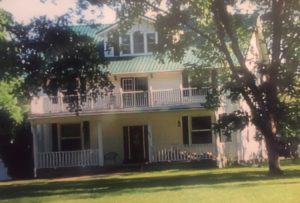NOTE ONE: So, what happened? Why was Friday’s story posted a day late? [The only time that’s happened in almost a year, let me add.] The short answer is I just dropped the ball. I was at Snowbird, in the mountains of North Carolina, with friends and family, pitching shoes, playing Hearts, and sitting around the fire retelling old jokes — not the start to finish, of course, just the punch lines.
And I forgot.
NOTE TWO: I went on a six-day hike in the Grand Canyon last month [Oct. 17-22]. It was interesting and I’m going to write about it soon.
And now, today’s story:
In 1961 my ship, USS Los Angeles, ran from Nancy, a super typhoon with wind speeds of 215 mph, the strongest ever measured in a tropical cyclone.
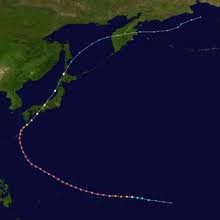
But we didn’t run quite fast enough, apparently, or far enough. Or Nancy was just too big to completely escape.
During the height of the storm the Los Angeles, a heavy cruiser, was battened down from one end to the other. No one was allowed on deck.
Standing watch on the bridge I saw waves crash across the main deck, land on top of the number two turret, and splatter the windows of the bridge.
It was a heck of a storm.
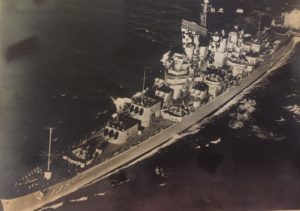
We sat on benches in the enlisted men’s mess deck and ate off tables with rims. In rough weather you held your tray with one hand and ate with the other. If you got up to get more milk — there was a milk dispenser in each compartment — you had to time your move just right, so you could get back to your tray before the ship rolled again.
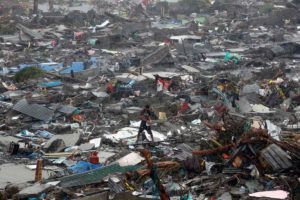
A guy across from me, at the end of the table, had bad timing. And when his tray began sliding, both of the sailors directly across from me pick up their trays and let the sliding tray go right on by, to the other end of the table, where it jumped the rim and made a mess on the deck. The two guys set their trays back on the table, acted as if nothing had happened, and kept on eating. Never said a word.
But the thing I remember best is the water fountain on our mess deck. During the typhoon the LA rolled so hard that when you turned on the fountain water fell on the deck.
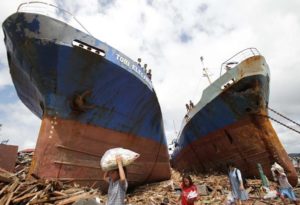
Postscript: The Stars and Stripes, a Department of Defense newspaper, reported in September 1961 that at least 1,056 ships and fishing vessels were sunk or blown ashore by Typhoon Nancy and many more were damaged.
Coming Friday: Squelched
